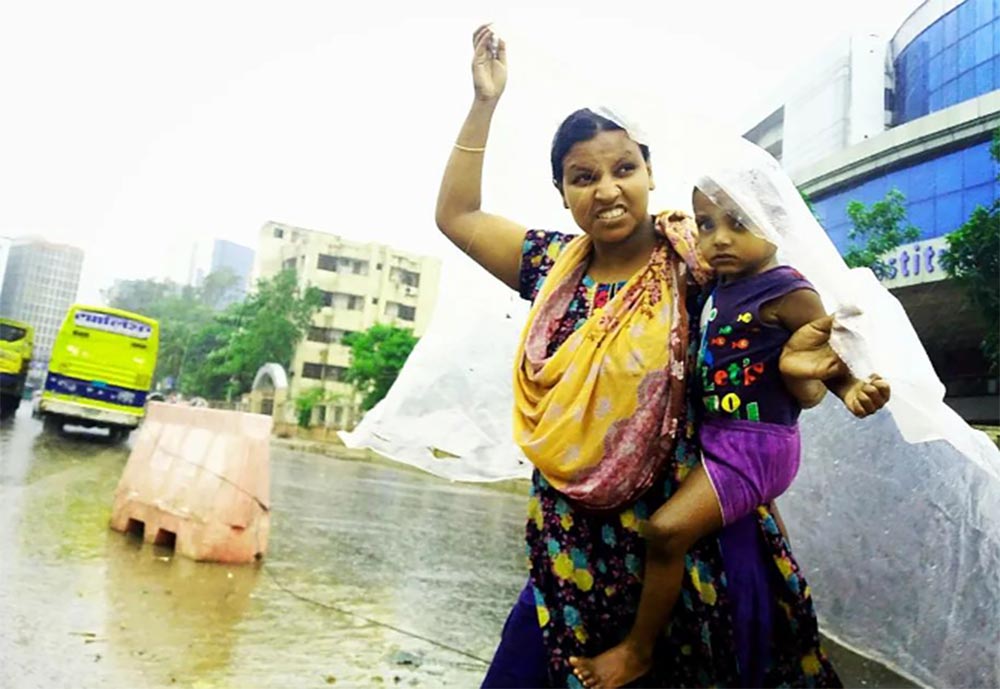
সহকারী অধ্যাপক


০১ আগস্ট, ২০২৩ ১২:০৬ পূর্বাহ্ণ

সহকারী অধ্যাপক

Climate
change impact on urban women in Bangladesh
Climate change poses
significant threats to human health, particularly in densely populated urban
areas like Bangladesh. Where women are more likely to migrate than men due to
the loss of livelihoods, food insecurity and lack of adaptation options in
their villages.
Razia Khatun
(Pseudonym), a 43-year-old woman, works as a cook at a roadside hotel in
Motijheel. She lives in a slum near Kamalapur Railway station in Dhaka.
Approximately fifteen years ago, she migrated to
Dhaka city from Dacope upazila Khulna because she lost her house due to Aila
Cyclone. Her husband is a newspaper hawker, but now the sale of newspapers is
down and they have four daughters and two sons.
Razia
is extremely worried about what the future holds for their children, as they
cannot provide proper food and educational opportunities for her children due
to their financial constraints.
Major concern is their three daughters are at
puberty stage just before marriageable age, but due to both financial and
proper food crisis, Razia and her husband are unable to arrange better things
for their children.
She is also concerned about her son's future, as
many boys his age in the slum are addicted to drugs, and some are involved in
theft, extortion and mugging.
Sometimes she wishes they could go somewhere
else, but as their house in the village was under water since 2007, she doesn't
have any other options.
Human health is seriously threatened by climate
change, particularly in Bangladesh's heavily populated metropolitan regions.
People being uprooted and moving from rural to
urban regions is one of the main effects of climate change in Bangladesh.
More than 70 percent of the slum migrants in
Dhaka come from coastal districts that are badly affected by cyclones, floods,
saline intrusion, and sea-level rise, according to a recent UN Women Bangladesh
report.
Due to lost employment opportunities, food
insecurity, and a lack of adoption choices in their villages, women are more
prone than males to move.
According to a recent report by UN Women, IUCN
and UNEP (2022), climate change has a gendered impact on various sectors in
Bangladesh, such as crop agriculture, water resource management, forestry and
renewable energy.
For instance, while men have greater access to
and control over natural resources than women do, women are more dependent on
them for their income and means of subsistence.
A significant percentage of unpaid care work,
which rises with climate-related disasters and displacement, is also
disproportionately carried by women.
Moreover, during and after climate-related
events, women are more likely to experience assault and harassment in public
places and shelters.
Because they are more likely to be poor than
males, women are more susceptible to the effects of climate change.
The effects of climate change may be exacerbated
by gender inequality. Women might, for instance, have limited access to
resources and education that would enable them to adjust to shifting
environmental conditions.
Additionally, women may be excluded from
decision-making processes related to climate change mitigation and adaptation.
Women in urban poverty face a difficult reality
when it comes to their health at different phases of their lives.
These women have various challenges during
pregnancy as a result of their restricted access to appropriate prenatal care
and healthcare facilities.
The mother and the infant are at danger when there
is inadequate nutrition and healthcare due to a lack of knowledge and
resources.
Adolescent females in urban disadvantaged areas
also face a variety of difficulties.
They are susceptible to a variety of health
concerns because of the lack of comprehensive sexual education and their
restricted access to healthcare facilities.
The nutritional status of women in
underprivileged urban settings is still an issue.
Their access to wholesome food is frequently
limited by a lack of financial means, which causes malnutrition and associated
health issue